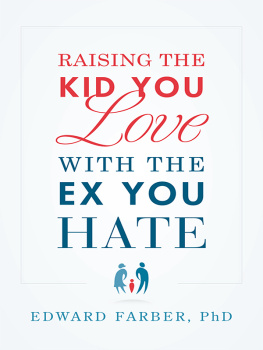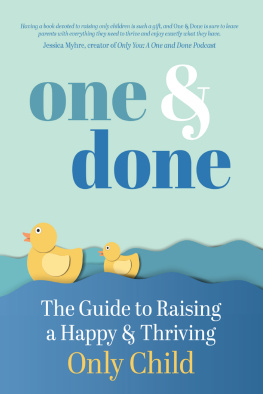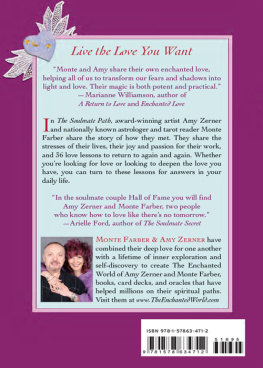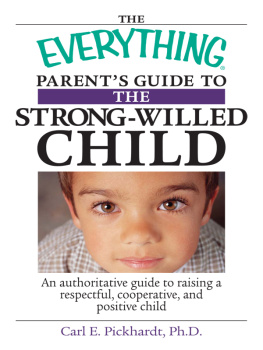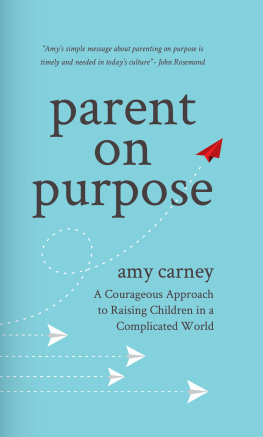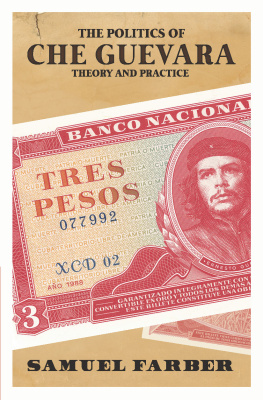Praise for
Raising the Kid You Love with The Ex You Hate
If you are divorced, or contemplating divorce, you need this book. Drawing on decades of experience helping families, Dr. Farbers time-tested advice shows parents how to do right by their children. With clarity and compassion, the book helps parents anticipate and avoid common pitfalls. Follow Dr. Farbers wise and practical rules and your children will flourish after the breakup, secure in the knowledge that your love for them trumps your disappointments in the marriage.
Dr. Richard A. Warshak, clinical professor at The University of Texas Southwestern Medical Center and author of Divorce Poison: How To Protect Your Family From Bad-mouthing and Brainwashing and Welcome Back, Pluto: Understanding, Preventing, and Overcoming Parental Alienation
Divorce is hard on kids, but what hurts kids even more is nasty conflict between their parents. Based on his extensive experience with children of divorce, clinical psychologist Edward Farber provides an invaluable guide through the minefield of mistakes that angry ex-spouses need to avoid in order to co-parent after a divorce.
Dianne L. Chambless, PhD, professor and director of clinical psychology training at the University of Pennsylvania
Dr. Farbers book is a must read for divorcing/divorced parents who want to insure their childrens well-being and future adjustment. Dr. Farber adeptly describes the hurt and anger that parents in this difficult life transition can feel and how these negative feelings can cloud parents decisions about and actions toward the children they love. Using case examples to illustrate the feelings, dilemmas, and decisions that divorcing/divorced parents face, Dr. Farber provides practical child development-enhancing strategies and prescriptions that will guide parents to facilitate their childrens emotional sturdiness and well-being over time.
Dr. Carol Weissbrod, director of clinical training and associate professor of psychology at American University
Dr. Farber is that good conscience wed all like to have looking over our shoulders. His light touch and solid practical advice for the divorced parent is easy to read and sure to save readers and their children from a lot of anxiety and legal bills. I cant wait for his next book full of guidance for other aspects of our lives!
Dan Oren, MD, psychiatrist and medical director of BH Care and co-author of How to Beat Jet Lag


This book is intended as a reference volume only. It is sold with the understanding that the publisher and author are not engaged in rendering any professional services. The information given here is designed to help you make informed decisions. If you suspect that you have a problem that might require professional treatment or advice, you should seek competent help. The stories and factual accounts in this book have been fictionalized and altered to protect the privacy of the individuals and their families. Persons referenced in this book may be composites or entirely fictitious, thus references to any real persons, living or dead, are not implied.
Published by Greenleaf Book Group Press
Austin, Texas
www.greenleafbookgroup.com
Copyright 2013 Edward Farber
All rights reserved.
No part of this book may be reproduced, stored in a retrieval system, or transmitted by any means, electronic, mechanical, photocopying, recording, or otherwise, without written permission from the publisher.
For ordering information or special discounts for bulk purchases, please contact Greenleaf Book Group LLC at PO Box 91869, Austin, TX 78709, 512.891.6100.
Design and composition by Greenleaf Book Group LLC and Philip Salazar
Cover design by Greenleaf Book Group LLC
Ebook ISBN: 978-1-60832-421-7
Ebook Edition
To the kids I love,
Yoni and Orly
CONTENTS
INTRODUCTION
Colin was seven when his parents divorced. He lived with his mother and she made most of the day-to-day decisions, but Colins father was involved in academic, health, and extracurricular activity decision making. Colin frequently spent time with his father on weekends and knew he was a part of his life.
Father remarried and took a position in California. Once a month, Father would come to DC for work and arranged the trips so he could be in Washington over the weekend. The parents flexibility allowed him to see Colin weekday evenings when Father was in DC, too. Father always stayed at the same suite-style hotel, and the hotel stored a duffel with some of Colins clothes, games, books, toys, and pictures to make the suite feel like home. Father would always tack Colins school projects to the walls, arrange his books and an extra Game Boy around his bed, and place photos of Colins dog, baseball team, and family vacations in picture frames around the room. Colin had access to a laptop and video games at the hotel.
A few days before Father planned a visit, Mother would email him the title of whatever book Colin was reading, and Father would make sure to get a copy to leave by Colins bed in the room. Colin only had to add his weekend sports uniforms to the homework in his backpack on the Thursdays and Fridays his father would pick him up from school. Colin could invite friends on the weekend, and, especially during the winter, the hotels small indoor swimming pool and gym were a hit with his buddies. Teacher meetings and routine pediatrician visits were often arranged during the week of visitation so Father could attend, and during that week Father took over transporting Colin to sports practices, religious school classes, and piano lessons.
Even though parental decision making became more and more Mothers responsibility, Father was involved during his monthly visits. He provided money for Colins care, and his input was welcome. Parental conflict was kept to a minimum.
The parents agreed that Colin would fly to California several times a year over long weekends and extended school holidays using Fathers frequent flyer miles, but the difficulty of transportation quickly became apparent. Colin was anxious both about flying by himself, even as an accompanied minor, and about missing sports and friends over the breaks. Although he enjoyed seeing his father and stepmother, he had no friends in California and was often bored. Transcontinental travel also disrupted Colins sleep, and Colin would be tired for several days after he came home. Father didnt have a piano, so Colin couldnt practice while there, either.
Then one Presidents Day weekend, a major storm delayed Colins plane. His nonstop flight ended up landing in the Midwest and was then diverted away from LAX to an alternate airport in California. After nearly twenty hours of commuting, Colin had had enough, and his parents agreed that short three- and four-day visits to California would end. Instead, Colin would go to California for part of his Christmas holiday, spring breaks, and a month in the summer. Since Colin still didnt have friends in California, his summer visits were arranged so that he could attend local summer camps most of the month. His father even bought an electric keyboard, hoping that Colin could use that to practice the piano over the summer.
The few conflicts the parents had were relatively easily resolved, and Colin didnt display major problems other than some anxieties. He was a somewhat shy, slow-to-warm-up boy, hesitantly adapting to new situations. Father backed off over imposing his feelings about Colins development, learned how to give his opinions in a non-forceful manner, and honored his financial obligations. Father didnt challenge the cost of orthodontist consults or longer piano lessons. Thanks to their extended monthly visits, Father and Colin had a comfortable, solid relationship, and Father actively participated in his sons growth and development.
Next page
